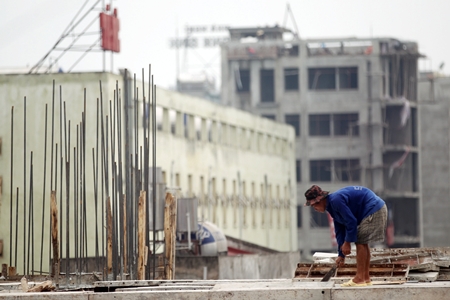Vietnam’s real-estate market is expected to receive a new infusion of money following a deposit interest-rate cut to 9 per cent from 12-13 percent by the State Bank of Viet Nam and a subsequent fall in loan interest rates.
This was the fourth time during the last three months that the central bank has decided to reduce the dong interest-rate on deposits.
The central bank’s latest move resulted in a decrease in interest rates on loans with various terms at commercial banks.
 A worker is seen at a construction site in Hanoi, Vietnam. (EPA/Luong Thai Linh)
A worker is seen at a construction site in Hanoi, Vietnam. (EPA/Luong Thai Linh)
Last month at Vietcombank, the bank decided to slash the interest rate of termed loans to 12-13 per cent.
Experts said that with such lending interest rates, enterprises’ financial burdens created from high capital costs would ease significantly, thus encouraging them to invest in production.
The lower interest-rate cap of deposits also means that depositing money at banks was no longer an attractive investment channel.
These changes have prompted many people to shift from depositing their savings into the banking sector to other investment channels that they believe will bring profit in the future.
Real estate, along with other sectors, is still popular among long-term investors since property developers, who have been thirsty for capital, have cut prices by 30-40 per cent.
According to many real estate offices in HCM City, within one month, the number of clients who came to buy houses increased significantly, but the number of transactions was still modest.
Trinh Xuan Bac in Tan Phu District said that, although the real estate market remained sluggish, investment in real estate products would bring profits in the long term.
Previously, Bac had deposited money at a bank while he waited for real estate prices to drop even more.
However, he believes that the current interest rate is not attractive enough to deposit money in banks and that now is the right time to invest in property when the prices are low.
Huynh Anh Minh, director of a real estate company in District 2, said the number of people seeking to buy land plots and apartments had increased slightly in weeks, and the number of successful transactions had increased by 20 per cent compared with previous months.
Investors were especially interested in land plots in outlying districts such as Binh Chanh and Cu Chi, Minh said.
Real estate developers have said that the rapid interest-rate reduction had greatly affected investors and individuals who want to buy a home. The lowering of the deposit interest-rate cap to 9 per cent and the banks’ commitments to slash the lending interest rate to 13 or 14 per cent have led people to believe that the property sector would warm up again.
Ngo Dinh Han, director of the ACB real estate trading floor, said the recent interest-rate reduction had not yet created a significant impact on the real estate market.
But he was confident that more money would be pumped into the market, thus improving its liquidity in the future.
The market’s real changes would likely take place in the third quarter of the year, Han said.
Pham Thanh Mai, general director of the Viet Nam Real Estate Association, said the domestic real estate market would continue to meet capital-related difficulties in the near future.
Thus, real estate developers should use mobilised capital resources effectively and efficiently.
Mai said that real estate companies should prepare long-term investment strategies while reducing their risks to ensure available cash flows for important projects.




